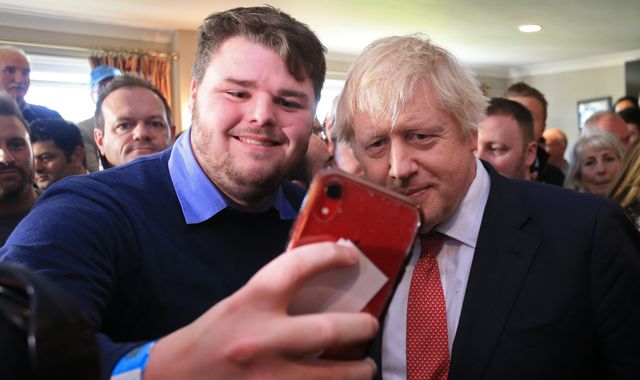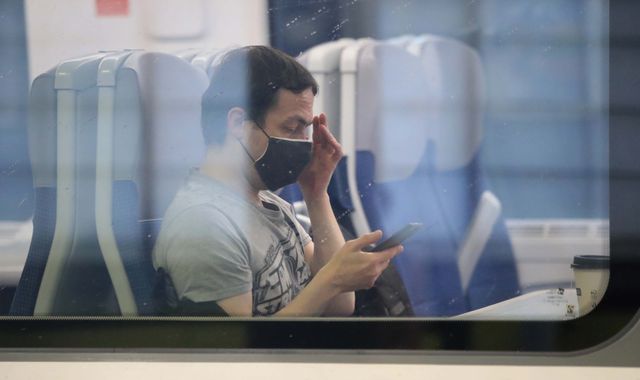‘They have still got to deliver’: Is support for Boris Johnson in red wall seats crumbling?
Written by News on 19/07/2020
We get to Sam Zair’s cafe in the centre of Bishop Auckland at about 4pm as he’s shutting up shop.


When we last saw him in January, Boris Johnson had just won a landslide victory, snatching dozens of Labour’s red wall seats on his promise to “Get Brexit Done” and “level up” the country.
Bishop Auckland was one of his wins and Sam, who’d once been a Liberal Democrat councillor but was now a Brexit and Boris Johnson backer, was optimistic about the prospects for his community.
He’s as warm and friendly as I remember when we meet again, but the strain of the past few months is plain to see.
“It’s been horrendous,” he tells me as we talk about having to close the cafe, opened by his great-grandfather over 100 years ago, during the lockdown.
“I felt like I was a failure,” he said.
“This business still traded through World War One, the Spanish Flu and World War Two. For three generations my father, my great grandfather, still traded. But this was a different kettle of fish because it had to close down.”
When he re-opened on 15 June he was “terrified that no one would come”.
Things are slowly getting better but Sam is in no doubt it will be a long haul. “It’s the toughest I’ve ever known in my lifetime,” he said.
“It’s going to take a long time before people find the confidence to come back onto the streets and get back to using local businesses again.”
The scale of the 2019 electoral earthquake cannot be overstated. Mr Johnson won an 80-seat majority as the Labour party returned its lowest number of MPs since 1935. The Brexit election scrambled political identities.
For the first time ever, the Tory party out-polled Labour when it came to low-income voters and it is now more popular with that group than with high-income voters, according to a recent report by the Joseph Rowntree Foundation.
But now seven months later, Brexit Britain has been scrambled again by a once-in-a-century pandemic which has far-ranging and profound consequences that will play out for years to come.
And it is communities like Bishop Auckland that will feel it the most.
The North East is projected to be one of the worst-hit regions from the fall-out of coronavirus in the medium term, according to a report released in May by the Centre for Progressive Policy.
CPP analysis found that red wall areas have a high proportion of vulnerable local authorities – those it expects to particularly struggle in recovering from the crisis, with nearly half of red wall local authorities ‘vulnerable’ against 23% across the UK as a whole.
Those seats could see a 12% permanent output loss, against a 5% contraction in the South East.
“To avoid large permanent losses in some of the country’s most vulnerable places, the government must return to a revitalised levelling up agenda,” the CPP report concluded.
It is a message I hear loud and clear in my many conversations with people across Blyth, Bishop Auckland and Barnard Castle. Just as it was seven months ago, support in this part of the world for Boris Johnson and his government is qualified and shallow.
Those who ran businesses were grateful for the financial support the government had given to keep them afloat during the shutdown and, in the main, willing to give ministers in Westminster the benefit of the doubt when it came to managing the crisis.
And when it comes to the prime minister himself – whose personal polling ratings have fallen during this crisis – those I spoke to were appreciative that he was sticking to his promises on Brexit and levelling up, but some were less impressed at times by his handling of the crisis.
Michelle, who lives in Blyth and had religiously followed the daily news conferences, said she thought Mr Johnson was “a waffler”. David, a retired engineer and Brexiteer who I met in Barnard Castle, says his faith in the government’s handling of the crisis has diminished over the course of the lockdown.
He told me he was “disgusted” that the PM’s chief advisor Dominic Cummings had come to Barnard Castle at the height of the crisis and he was also doubtful over the government’s changing advice on face masks. “We should have been wearing face masks from the start,” he said.
Voters also expect the prime minister to honour the manifesto promises of 2019 – regardless of the coronavirus crisis.
Brexit must be done by the end of the year and the investment into their communities must come.
Pauline and her 83-year-old mum Dot, who I got chatting to in the Tudor Cafe in Bylth, were very matter-of-fact about what lay ahead. “It’s going to be very hard for Blyth,” she said.
But Pauline, who was bringing her mum out to the cafe for the first time in five months, also spoke of the optimism she still felt about her community’s prospects.
“I really do live in hope. They are talking about bringing the railway back, we need to bring more shops into the town centre.
“I’m on my soapbox because I just feel so passionate about it,” she said. “It’s just forgotten. Forgotten. I hope it comes together and they do it because I think we could bring a lot of people into Blyth.
“We’ve given someone else a chance, let’s see what happens. You now, that’s all you can do. People wanted a change.”
But the economic landscape on which those promises were made hasn’t just shifted, it’s completely transformed. In two months the economy has contracted by 25%; 18 years of growth gone in a matter of weeks.
The chancellor has committed over £300bn in government support and additional public funding committed since 11 March via the furlough scheme, more generous benefits, business grants, public spending, tax deferrals and loans.
The fiscal watchdog predicts government borrowing will reach £370bn this year and says getting the government’s debt down to about 75% of GDP would require tax rises or spending cuts of about £60bn, every decade, for the next 50 years.
Which raises the obvious question of whether the government has the economic firepower and political will to fulfil the promises they made.
The coronavirus crisis has cast a long economic shadow on the UK and at some point ministers will have to start clawing money back rather than just dishing it out.
Mr Johnson renewed his vows to the red wall in his Dudley speech at the end of June when he reiterated his “mission to unite and to level up” and “build, build, build” our way back to prosperity with more economic interventionism. His own “new deal”.
But he knows there is an obvious tension between his vision of Rooseveltian economic interventionism and the instincts of a party defined in the principles of low taxes, the free market, the small state.
The Conservatives’ political rivals think this is a tension that could hurt Mr Johnson and help them slowly win back support ahead of the next election.
“The areas that are going to be most hard hit by the job losses are going to be seats Boris Johnson won in the North East and the Midlands,” says one senior Labour figure.
“These places risk the biggest spikes in unemployment because they are low-skilled jobs and more heavily focuses on retail and a manufacturing base as well.
“There will be a tension between the Tory 2019 intake and the rest of the party – and not just on a philosophical basis but on a practical basis of constituency pressure.”
Since this crisis began, regional disparities have widened – and things are going in the wrong direction for the North East.
Mr Johnson’s task right now is to try to kickstart the economy. The task in the coming years is to rebuild the national economy while also trying to close regional gaps. It was already a Herculean task to achieve and COVID-19 has made it harder still.
“It’s going to be very, very difficult. Very difficult,” agrees Sam Zair, but the promises still stand.
“I think [this government] knows at the back of their minds places such as Bishop Auckland, the North and the rest of the North East towns, they have still got to deliver in this neck of the woods in five years’ time.”
(c) Sky News 2020: ‘They have still got to deliver’: Is support for Boris Johnson in red wall seats crumbling?







